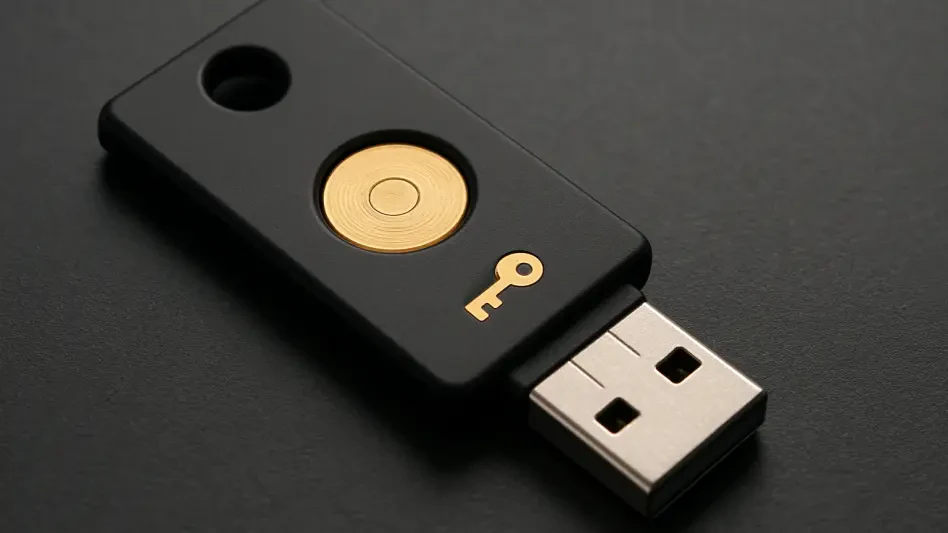In a digital landscape where cyber threats are becoming increasingly sophisticated, safeguarding online accounts and sensitive information has never been more critical for individuals and organizations alike. Hardware security keys have risen to prominence as the gold standard for digital protection, providing an unparalleled layer of two-factor authentication (2FA) that surpasses the vulnerabilities of passwords or SMS-based codes. These compact physical devices, connecting through USB, NFC, or Bluetooth, create a formidable barrier by requiring both a password and the key itself for access, ensuring that even if credentials are stolen, unauthorized entry remains nearly impossible. As cybercrime continues to escalate with tactics like phishing and hacking, the demand for robust security solutions is at an all-time high. This article delves into the leading hardware security keys available now, highlighting top contenders such as the YubiKey series and exploring their features through rigorous evaluation of compatibility, durability, and user experience. From personal users protecting private data to enterprises securing vast networks, there’s a tailored solution for every need. The exploration ahead uncovers why these devices are indispensable in today’s environment, shedding light on emerging trends and standards that shape the future of cybersecurity while offering practical insights for choosing the right key to ensure ultimate protection against digital threats.
The Critical Need for Enhanced Digital Defense
In an era where data breaches and identity theft dominate daily headlines, hardware security keys stand as a vital shield against the relentless evolution of cyber threats, offering robust protection in an increasingly digital world. These devices go beyond traditional authentication methods by introducing a physical component to the login process, requiring possession of the key alongside a password. This dual requirement drastically reduces the risk of unauthorized access, even in the face of sophisticated attacks that can intercept software-based two-factor authentication (2FA) like text messages or app notifications. For anyone managing sensitive information—whether it’s financial records, proprietary business data, or personal details—the consequences of a breach can be devastating, making the adoption of such technology not just advisable but essential. Unlike other methods prone to remote exploitation, hardware keys offer a tangible defense that’s nearly impervious to duplication or hacking from afar, establishing them as a cornerstone of modern security practices.
The significance of hardware security keys extends across diverse user groups, from individuals securing social media accounts to corporations protecting vast digital infrastructures, highlighting their critical role in modern cybersecurity. Their ability to thwart phishing attempts, a common vector for credential theft, sets them apart as a trusted solution in a landscape where attackers continuously refine their methods. By requiring physical interaction, these keys eliminate the possibility of remote manipulation, providing peace of mind for users handling high-stakes information. Moreover, their growing recognition by major platforms and services underscores a shift in the industry toward prioritizing unassailable authentication. As cyber risks multiply, embracing this technology becomes a proactive step to safeguard digital identities against an unpredictable array of threats, reinforcing the urgency of integrating such robust measures into everyday security protocols.
Seamless Integration Across Devices
When selecting a hardware security key, compatibility with an array of devices is a fundamental consideration to ensure a frictionless experience across varied technological ecosystems. Today’s leading keys cater to this need by offering multiple connectivity options, such as USB-A for older hardware, USB-C for contemporary laptops and tablets, and NFC for contactless authentication on mobile devices. This versatility allows users to transition effortlessly between a desktop at the office, a personal MacBook, or a smartphone while on the move, without worrying about mismatched ports or unsupported systems. Products like the YubiKey 5C NFC exemplify this adaptability, supporting a broad spectrum of platforms including Windows, macOS, Android, and iOS, thereby ensuring that security remains consistent regardless of the device in use. Such cross-compatibility is crucial for maintaining a cohesive defense strategy in a world where multi-device usage is the norm.
Beyond mere connectivity, the best hardware security keys are designed to integrate smoothly with a wide range of services and applications that dominate digital life. From cloud-based platforms like Google and Microsoft to password managers that streamline credential handling, these keys facilitate authentication without disrupting workflow. This seamless operation across browsers and operating systems eliminates the frustration of technical barriers, making security accessible to users of all technical backgrounds. Additionally, the ability to support multiple accounts on a single key addresses the practical needs of those juggling numerous logins, enhancing convenience without compromising protection. As device ecosystems continue to diversify, the emphasis on universal compatibility in hardware security keys ensures they remain a practical and indispensable tool for safeguarding digital interactions across all facets of life.
Built to Last in Real-World Conditions
Durability is a defining trait of top-tier hardware security keys, as these devices are often subjected to the rigors of daily life while remaining a critical line of defense against cyber threats. Designed to endure, many of the best options available today boast features like water resistance and crush-proof construction, capable of withstanding accidental drops, exposure to moisture, or even extreme conditions like a spin in a washing machine. This ruggedness is not a mere luxury but a necessity for tools that are frequently carried on keychains, tucked into pockets, or tossed into bags alongside other items. Knowing that a security key can survive such mishaps without failing provides users with confidence in its reliability over the long term, ensuring continuous protection without the need for frequent replacements or repairs due to physical damage.
The focus on build quality also reflects an understanding of how integral these devices are to everyday security routines, ensuring they remain reliable under various conditions. Manufacturers of leading security keys prioritize materials and engineering that resist wear and tear, acknowledging that a compromised device could mean a compromised defense. This durability extends the lifespan of the key, making it a worthwhile investment for both individual users and organizations deploying them at scale. Furthermore, the resilience of these tools caters to diverse lifestyles, from busy professionals who travel frequently to students who may not always handle gadgets with care. By embedding such robustness into their design, hardware security keys prove themselves as dependable companions in the quest for digital safety, capable of standing up to the unpredictability of real-world use while maintaining their core functionality intact.
Prioritizing Simplicity in Authentication
Security should never come at the expense of usability, and the finest hardware security keys available today strike a delicate balance by offering intuitive designs that simplify the authentication process. Features such as touch-based activation or visual cues like blinking lights guide users through logins with minimal effort, making these devices approachable even for those unfamiliar with advanced technology. This ease of use is critical in encouraging widespread adoption, as complexity can deter individuals from embracing essential protective measures. By reducing the learning curve, top keys ensure that safeguarding accounts with robust 2FA becomes a natural part of daily digital interactions, seamlessly fitting into routines without adding unnecessary friction or confusion for the user.
Beyond basic functionality, many of these keys enhance the user experience through thoughtful integration with widely used platforms and services. Compatibility with major ecosystems like Google, Microsoft, and various password managers means authentication happens swiftly and without cumbersome setup processes. Some advanced models even incorporate biometric features, such as fingerprint recognition, which not only bolster security but also expedite access with a quick scan rather than additional steps. This fusion of convenience and protection addresses a key concern: ensuring that heightened security measures do not hinder productivity or accessibility. As a result, hardware security keys stand out as user-friendly solutions that empower everyone to protect their digital presence without sacrificing efficiency or ease in their day-to-day online activities.
Adhering to Modern Security Protocols
At the heart of a hardware security key’s effectiveness lies its adherence to cutting-edge standards that define the future of authentication, ensuring robust protection in a digital world. Protocols like FIDO2 and WebAuthn have become benchmarks for the industry, enabling passwordless login methods that eliminate the inherent weaknesses of traditional passwords. By supporting these standards, the most reliable keys ensure compatibility with a vast array of modern browsers, operating systems, and services, guaranteeing that users benefit from the latest advancements in cybersecurity. This alignment with progressive protocols not only fortifies defenses against current threats but also prepares for emerging risks, making such keys a forward-thinking choice for anyone committed to maintaining a secure digital footprint in an ever-changing threat landscape.
The importance of these standards cannot be overstated, as they represent a global push toward more resilient authentication frameworks that safeguard digital interactions. FIDO2, for instance, allows for secure interactions without the need to store sensitive data on external servers, reducing exposure to breaches. Meanwhile, WebAuthn facilitates seamless integration across platforms, ensuring that security keys function consistently whether accessing a cloud service or a local application. Choosing a key that embraces these protocols means investing in a solution that’s not only effective today but also equipped to handle the challenges of tomorrow. This commitment to modern security principles underscores why hardware keys are seen as indispensable, providing a robust foundation for protecting online identities against increasingly sophisticated cyber adversaries.
Emerging Innovations in Authentication Technology
The landscape of hardware security keys is undergoing a transformative shift, driven by trends that promise to redefine digital protection. A significant movement is the push toward passwordless authentication, championed by organizations like the FIDO Alliance, which advocates for replacing vulnerable passwords with more secure alternatives such as physical keys or biometric data. This paradigm shift is gaining traction across industries, as it addresses the root cause of many breaches—weak or stolen credentials. By eliminating passwords, users can engage with services more securely, while enterprises benefit from reduced risks of large-scale compromises, marking a pivotal change in how authentication is approached on a global scale.
In parallel, hardware security keys are incorporating advanced features that anticipate future threats and user needs, ensuring they remain robust in an ever-changing digital landscape. Quantum-resistant algorithms are being integrated to safeguard against the potential of quantum computing to break traditional encryption, ensuring long-term relevance. Adaptive authentication, which dynamically adjusts security requirements based on contextual factors like location or time of access, adds another layer of intelligence to these devices. These innovations reflect a proactive stance in cybersecurity, where staying ahead of potential vulnerabilities is as crucial as addressing current ones. As these trends continue to evolve, hardware security keys are positioned not just as reactive tools but as forward-looking solutions that adapt to the complexities of an increasingly digital world.
Personalizing Security with Biometric Features
Biometric authentication is revolutionizing hardware security keys by introducing a deeply personal element to digital protection, transforming how we safeguard our digital identities. High-accuracy fingerprint recognition and sophisticated 3D facial mapping with anti-spoofing capabilities are now featured in premium models, offering users a swift and secure way to verify their identity. These technologies enhance the authentication process by ensuring that access is granted only to the rightful owner, significantly reducing the risk of unauthorized use even if a key is lost or stolen. The speed of biometric verification also means that security doesn’t slow down daily routines, providing a seamless blend of robust defense and practical convenience for users across various contexts.
Equally important is the commitment to privacy embedded in these biometric advancements. Leading hardware security keys store sensitive data directly on the device, preventing it from being uploaded to external servers or cloud systems where it could be vulnerable to breaches. This on-device processing builds trust among users who may be wary of sharing personal information, ensuring that adopting biometric features doesn’t come with hidden risks. By prioritizing data protection alongside innovative authentication methods, these keys address both security and ethical considerations, making them a compelling choice for those seeking a tailored approach to safeguarding their digital interactions in a landscape where privacy concerns are as pressing as cyber threats.
Meeting the Demands of Organizational Security
For enterprises, hardware security keys must deliver solutions that scale to meet the complex needs of large organizations while adhering to stringent regulatory requirements. Centralized management tools are a cornerstone of enterprise-grade keys, allowing IT administrators to oversee deployment, monitor usage, and enforce policies across thousands of devices with ease. Compliance with standards like FIPS 140-3 or Common Criteria is non-negotiable for industries such as government and finance, where security protocols must align with legal mandates. These features ensure that businesses can maintain a secure environment without sacrificing operational efficiency, addressing the unique challenges of protecting vast networks and sensitive data at scale.
Beyond management and compliance, versatility in authentication protocols is critical for corporate environments with diverse systems and requirements. Support for multiple standards, including FIDO2, U2F, PIV, and OpenPGP, enables keys to adapt to various use cases, from employee logins to securing privileged access to critical infrastructure. This flexibility ensures that organizations can implement a unified security strategy without being constrained by incompatible technologies. Additionally, the ability to integrate with existing identity management systems streamlines adoption, reducing the burden on IT teams while fortifying defenses. As businesses navigate an increasingly complex threat landscape, hardware security keys tailored for enterprise needs provide a reliable foundation for safeguarding operations against both internal and external risks.
Highlighting Standout Choices for Robust Protection
Among the array of hardware security keys available, the YubiKey 5C NFC stands out as a premier option for those seeking comprehensive protection. Its dual connectivity through USB-C and NFC ensures compatibility with a wide range of devices, from the latest laptops to mobile phones, while its support for multiple protocols like FIDO2 and WebAuthn guarantees cutting-edge security. Renowned for exceptional durability, this key can endure physical stress and environmental challenges, making it a dependable choice for long-term use. Its seamless integration with major services and platforms further solidifies its position as a versatile tool, ideal for users who demand reliability and adaptability in their security solutions, whether for personal accounts or professional environments requiring stringent safeguards.
For those prioritizing affordability without compromising on essential protection, the YubiKey Security Key C NFC offers a compelling alternative. While it may lack some of the advanced features of its higher-end counterparts, such as support for additional protocols beyond FIDO standards, it delivers robust security with a straightforward setup process. Its rugged design withstands everyday wear and tear, ensuring consistent performance for users on a budget. Compatible with popular services and password managers, this key proves that effective two-factor authentication (2FA) doesn’t have to come with a hefty price tag. It caters perfectly to individuals new to hardware authentication or those needing a reliable backup, demonstrating that strong digital defense is accessible to a broad audience regardless of financial constraints.
Moving Forward with Uncompromised Security
Reflecting on the landscape of digital protection, hardware security keys have proven themselves as indispensable allies in the fight against cyber threats. Their ability to combine physical possession with advanced protocols has reshaped how authentication is approached, offering a tangible solution to vulnerabilities that plagued traditional methods. By spotlighting exceptional devices like the YubiKey 5C NFC and YubiKey Security Key C NFC, a clear standard for quality, versatility, and resilience has been established. These tools have addressed a spectrum of needs, from individual privacy to enterprise compliance, demonstrating their adaptability across varied contexts. As innovations like biometric integration and quantum-resistant algorithms have emerged, they set a precedent for what robust security entails in a dynamic digital age.
Looking ahead, the next steps involve embracing these technologies as part of a broader strategy to strengthen online safety. Users are encouraged to assess their specific needs—whether it’s device compatibility, durability, or advanced features—and invest in keys that align with those priorities, while also considering the practice of maintaining a backup key to prevent lockouts. Enterprises should focus on integrating scalable solutions with centralized oversight to ensure consistent protection across their operations. Staying informed about evolving standards and emerging threats will be crucial to maximizing the effectiveness of these devices. Ultimately, adopting hardware security keys represents a proactive commitment to safeguarding digital identities, ensuring that both personal and professional spheres remain secure against the unpredictable challenges of the cyber world.








